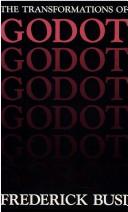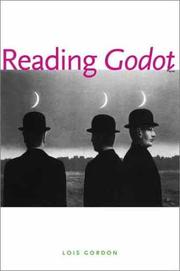| Listing 1 - 10 of 146 | << page >> |
Sort by
|
Book
ISBN: 1472543173 1472538897 1282875043 9786612875045 1441156100 9781441156105 9781472543172 9781472538895 9780826495938 0826495931 9780826495945 082649594X 9781282875043 6612875046 Year: 2008 Publisher: London New York Continuum
Abstract | Keywords | Export | Availability | Bookmark
 Loading...
Loading...Choose an application
- Reference Manager
- EndNote
- RefWorks (Direct export to RefWorks)
"'An impressively complete survey of the play in its cultural, theatrical, historical and political contexts.' - David Bradby, co-editor of Contemporary Theatre Review. Samuel Beckett's Waiting for Godot is not only an indisputably important and influential dramatic text -it is also one of the most significant western cultural landmarks of the twentieth century. Originally written in French, the play first amazed and appalled Parisian theatre-goers and critics before receiving a harshly dismissive initial critical response in Britain in 1955. Its influence since then on the international stage has been significant, impacting on generations of actors, directors and audiences."--Bloomsbury Publishing.

ISBN: 9780813148106 0813148103 9780813113920 0813183995 081311392X Year: 1980 Publisher: Lexington University Press of Kentucky
Abstract | Keywords | Export | Availability | Bookmark
 Loading...
Loading...Choose an application
- Reference Manager
- EndNote
- RefWorks (Direct export to RefWorks)
Didi, Gogo, Pozzo, Lucky -- the bizarre names stand out strangely against the bare-bones landscape of Waiting for Godot. In an intriguing new study of one of the most haunting plays of this century, Frederick Busi shows that these names serve important dramatic functions, reinforcing the changing roles assumed by the mysterious characters in their tortuous search for -- and avoidance of -- self. Busi also explores Beckett's convoluted literary relationship with James Joyce, especially as revealed in the plays-within-the-play and verbal jigh jinks of Finnegan's Wake, where, as in Godot, the
Book
ISBN: 3838273699 9783838273693 3838213696 Year: 2020 Publisher: Stuttgart
Abstract | Keywords | Export | Availability | Bookmark
 Loading...
Loading...Choose an application
- Reference Manager
- EndNote
- RefWorks (Direct export to RefWorks)
Andy Wimbush argues that quietism-a philosophical and religious attitude of renunciation and will-lessness-is a key to understanding Samuel Beckett's artistic vision. Using Beckett's published and archival material, he shows how Beckett distilled an understanding of quietism and turned it into a new aesthetic.
Book
ISBN: 3838268490 Year: 2017 Publisher: Stuttgart, Germany : Ibidem-Verlag,
Abstract | Keywords | Export | Availability | Bookmark
 Loading...
Loading...Choose an application
- Reference Manager
- EndNote
- RefWorks (Direct export to RefWorks)
Book
ISBN: 1474468551 0748665706 Year: 2012 Publisher: Edinburgh : Edinburgh University press,
Abstract | Keywords | Export | Availability | Bookmark
 Loading...
Loading...Choose an application
- Reference Manager
- EndNote
- RefWorks (Direct export to RefWorks)
Provides Beckett scholars with a range of first-class essays in a single volumeThe Reader makes readily available for the first time 18 major, previously uncollected significant essays from the Journal of Beckett Studies from 1992 to the present. Divided into two sections, Sources and Archives and Theories and Translations, and containing work by some of the world’s leading Beckett scholars (including John Pilling, James Knowlson, Shane Wellar and Mary Bryden) the volume reflects both a distinctive European emphasis as well as the ‘new pragmatism’ within Beckett Studies.Key FeaturesGathers 5 strongly textual essays laying out the underpinnings of Beckett’s texts Includes 2 theoretically informed essays by major French philosophers, Bruno Clément and Alain BadiouOffers a distinctive European emphasis, including studies of Beckett’s Italian translationsBrings together in one place high-quality, original research from immediately recognizable names in the field
Book
ISBN: 3838271939 9783838271934 3838211936 Year: 2019 Publisher: Stuttgart
Abstract | Keywords | Export | Availability | Bookmark
 Loading...
Loading...Choose an application
- Reference Manager
- EndNote
- RefWorks (Direct export to RefWorks)
Book
ISBN: 128303462X 9786613034625 904203310X 9789042033108 9042033096 Year: 2011 Publisher: Amsterdam New York Rodopi
Abstract | Keywords | Export | Availability | Bookmark
 Loading...
Loading...Choose an application
- Reference Manager
- EndNote
- RefWorks (Direct export to RefWorks)
Quoi dire, mal dire, ouïr, mal entendre, en-deçà du langage, à l’écoute d’un manque, mèr(e) morte ou « souffle-esprit » ? Dans et hors de la langue, triviale ou spirituelle, aimée ou haïe, anglaise ou française, exil ou patrie... Le travail de Beckett, dans ses pièces théâtrales, télévisuelles et radiophoniques, est le travail d’un poète sur la matière des mots, dénudés de leurs sens par trop utilisés, travail musical et rythmique, d’une exigence qui dépasse la frontière des langues dans leur labilité. Le théâtre beckettien donne à écouter une présence (peut-être celle du « mot perdu »), la présence d’une absence qui n’en finirait plus… Ainsi le néologisme de « spirivial » – qui provient (tout comme son dérivé, la « spirivialité ») de la jonction (ou bien encore du va-et-vient) entre le mot « trivial » et le mot « spirituel » – permet-il de désigner le passage ou bien encore l’anamorphose au cœur du processus de destruction-reconstruction, propre au langage beckettien. Il peut s’agir, par extension, du « lieu-non-lieu » de la Question ou du mystère qui palpite au centre d’un mouvement paradoxal-spiroïdal, involutif-évolutif, à la fois creuset et matrice de la « matière-idée ».
Book
ISBN: 1474216870 1474216862 1474216854 9781474216869 9781474216883 1474216889 9781474216852 9781474216838 Year: 2015 Publisher: London
Abstract | Keywords | Export | Availability | Bookmark
 Loading...
Loading...Choose an application
- Reference Manager
- EndNote
- RefWorks (Direct export to RefWorks)
At stake in this book is a struggle with language in a time when our old faith in the redeeming of the word-and the word's power to redeem-has almost been destroyed. Drawing on Benjamin's political theology, his interpretation of the German Baroque mourning play, and Adorno's critical aesthetic theory, but also on the thought of poets and many other philosophers, especially Hegel's phenomenology of spirit, Nietzsche's analysis of nihilism, and Derrida's writings on language, Kleinberg-Levin shows how, because of its communicative and revelatory powers, language bears the utopian "promise of happiness," the idea of a secular redemption of humanity, at the very heart of which must be the achievement of universal justice. In an original reading of Beckett's plays, novels and short stories, Kleinberg-Levin shows how, despite inheriting a language damaged, corrupted and commodified, Beckett redeems dead or dying words and wrests from this language new possibilities for the expression of meaning. Without denying Beckett's nihilism, his picture of a radically disenchanted world, Kleinberg-Levin calls attention to moments when his words suddenly ignite and break free of their despair and pain, taking shape in the beauty of an austere yet joyous lyricism, suggesting that, after all, meaning is still possible.
Book
ISBN: 9789042025875 9042025875 9786612594380 9042028971 1441616977 1282594389 9781441616975 Year: 2009 Volume: 332 Publisher: Amsterdam Rodopi
Abstract | Keywords | Export | Availability | Bookmark
 Loading...
Loading...Choose an application
- Reference Manager
- EndNote
- RefWorks (Direct export to RefWorks)
Molloy est sans doute l’une des œuvres beckettiennes qui a suscité le plus d’interprétations variées et parfois même contradictoires. Modalités po(ï)étiques de configuration textuelle : le cas de « Molloy » de Samuel Beckett prend comme point de départ cet état de fait, l’interroge et propose que la texture du roman en est largement responsable. En tant qu’artefact langagier, Molloy exploite exemplairement les possibilités contextuelles de signification de la langue française, aussi bien linguistiquement que littérairement. L’ouvrage procède à une série de micro-lectures qui réévaluent à fond la fonction textuelle de ce qu’on convient d’appeler les « jeux de mots » de Molloy . Il montre que les manières dont ces « jeux » sont inscrits dans leurs environnements restreints et étendus favorisent l’actualisation des significations multiples. Ces possibilités plurielles de signification sont poursuivies conséquemment non seulement à travers le Molloy français, mais aussi à travers les rapports que celui-ci entretient avec le Molloy anglais, d’une part, et avec des textes beckettiens et non-beckettiens pré- Molloy , d’autre part. Les « jeux de mots » du roman se découvrent ainsi être les pierres angulaires d’une complexe configuration architexturale. L’étude de cas de Molloy que présente Modalités po(ï)étiques de configuration textuelle est potentiellement pertinente pour l’ensemble du corpus beckettien dans la mesure où la méthode intégrative d’analyse utilisée est susceptible de révéler de nouvelles données concernant la particularité de texturation de ce corpus, de même que des œuvres individuelles qui le composent. L’ouvrage s’adresse aux lecteurs de Beckett, mais aussi à ceux qui s’intéressent à des questions touchant à la traduction, voire l’auto-traduction littéraire, à l’intertextualité et aux approches linguistiques de la littérature qui reposent sur la sémantique cognitive et interprétative.
Beckett, Samuel --- Poetics. --- Poetry --- Technique --- Beckett, Samuel, --- Criticism, Textual. --- Molloy (Beckett, Samuel)

ISBN: 0300092865 9786611731120 1281731129 0300132026 9780300132021 9780300092868 9781281731128 Year: 2002 Publisher: New Haven, Conn. Yale University Press
Abstract | Keywords | Export | Availability | Bookmark
 Loading...
Loading...Choose an application
- Reference Manager
- EndNote
- RefWorks (Direct export to RefWorks)
Waiting for Godot has been acclaimed as the greatest play of the twentieth century. It is also the most elusive: two lifelong friends sing, dance, laugh, weep, and question their fate on a road that descends from and goes nowhere. Throughout, they repeat their intention "Let's go," but this is inevitably followed by the direction "(They do not move.)." This is Beckett's poetic construct of the human condition. Lois Gordon, author of The World of Samuel Beckett, has written a fascinating and illuminating introduction to Beckett's great work for general readers, students, and specialists. Critically sophisticated and historically informed, it approaches the play scene by scene, exploring the text linguistically, philosophically, critically, and biographically. Gordon argues that the play portrays more than the rational mind's search for self and worldly definition. It also dramatizes Beckett's insights into human nature, into the emotional life that frequently invades rationality and liberates, victimizes, or paralyzes the individual. Gordon shows that Beckett portrays humanity in conflict with mysterious forces both within and outside the self, that he is an artist of the psychic distress born of relativism.
Beckett, Samuel --- LITERARY CRITICISM / Drama. --- Beckett, Samuel, --- BECKETT (SAMUEL), 1906-1989 --- EN ATTENDANT GODOT --- CRITIQUE ET INTERPRETATION
| Listing 1 - 10 of 146 | << page >> |
Sort by
|

 Search
Search Feedback
Feedback About UniCat
About UniCat  Help
Help News
News